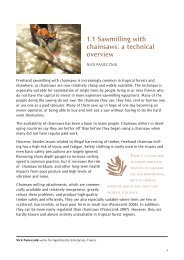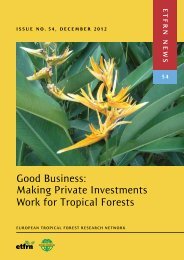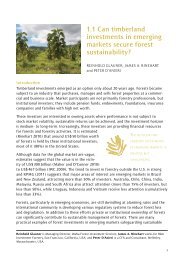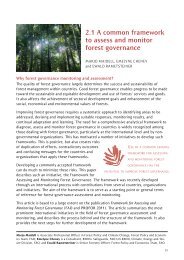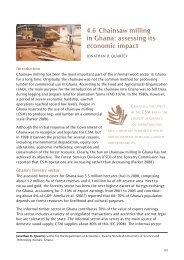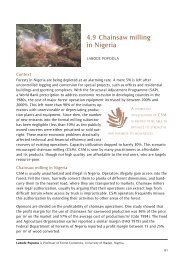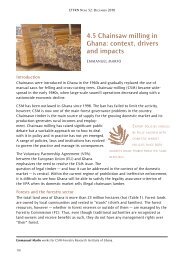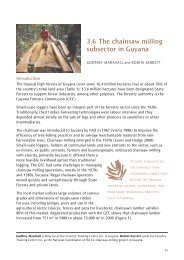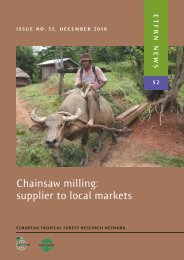Chainsaw milling: supplier to local markets - European Tropical ...
Chainsaw milling: supplier to local markets - European Tropical ...
Chainsaw milling: supplier to local markets - European Tropical ...
Create successful ePaper yourself
Turn your PDF publications into a flip-book with our unique Google optimized e-Paper software.
4.1 chainsaw <strong>milling</strong><br />
in the congo Basin<br />
GUILLAUME LESCUYER, PAOLO OMAR CERUTTI,<br />
EDOUARD ESSIANE MENDOULA, RICHARD EBA’A<br />
ATYI and ROBERT NASI<br />
Forestry in the congo Basin<br />
Forest management in the Congo basin 1 takes place in a context of widespread poverty.<br />
it is estimated that over 73% of people in the region live below the poverty line, most of<br />
them in rural areas where forest predominates (de wasseige et al. 2009). over the last two<br />
decades, forest policies have been used as a powerful lever <strong>to</strong> reduce poverty among the<br />
population, while also contributing <strong>to</strong> the development of the economy and the management<br />
of biodiversity.<br />
in 2007, the large-scale industrial forestry sec<strong>to</strong>r in Central africa produced nearly 8.4<br />
million m<br />
neiTher naTional<br />
3 of timber. Gabon, with nearly 3.4 million m3 , is the largest producer, followed<br />
by Cameroon (about 2.3 million m3 ). The smallest producer is the Democratic republic<br />
of Congo (DrC), with 310,000 m3 of formal timber<br />
production (de wasseige et al. 2009).<br />
sTraTegies nor public<br />
The forest legal framework in the Congo basin<br />
policies have been<br />
has improved in recent decades, with a large<br />
increase in the number of forest management<br />
developed To guide<br />
plans. nonetheless, the vast majority of policy The csm secTor Through formal,<br />
reforms targeted large-scale, export-oriented<br />
TransparenT and equiTable growTh.<br />
forestry operations, while neglecting small-scale<br />
chainsawn timber, which is mostly sold in the domestic timber <strong>markets</strong> but also exported<br />
regionally. although small-scale logging titles that authorize rural citizens <strong>to</strong> harvest few<br />
trees for their personal, non-commercial needs are included in all the legal frameworks in<br />
the region, they are generally not adapted <strong>to</strong> the current needs of chainsaw millers. as a<br />
consequence, the domestic timber sec<strong>to</strong>r remains largely informal. Despite its importance,<br />
chainsaw <strong>milling</strong> (Csm) — and its economic, ecological and social impacts — is<br />
unaccounted for in national and international statistics.<br />
small-scale logging in central africa: previous appraisals<br />
in Cameroon, the amount of wood illegally harvested by individuals or small enterprises<br />
and sold mostly on the informal domestic market was estimated at about 250,000 m 3<br />
Guillaume Lescuyer works for CiFor and CiraD; Paolo omar cerutti works for CiFor and australian<br />
national university; edouard essiane mendoula and robert Nasi work for CiFor; and richard eba’a Atyi<br />
works for the ForaF project (EC), kinshasa, DrC.<br />
121



